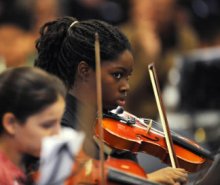 Blog
Blog
By James S. Catterall
If you have any attachment to music in the schools, you don’t need research or investigative journalism to know that things are in tough shape, not only here in the U.S., but across the developed world. The story has played out with some regularity for decades — economies boom and bust, school budgets get squeezed and music and the other arts take the first hits. The global economic downturn of the past two years has taken an especially hard toll on arts programs. Many school systems will have no music specialists serving elementary schools by next year.
What do we know about music learning and its effects? What should we expect in a future starved of music education in the public schools? Is this just longing for the old days when every second grade classroom had a piano and teacher who could play it? No, it’s a more serious story that doesn’t get better with each telling.
The research community I represent has investigated a wide array of effects that learning in music may have on child development. The late 1990s brought us the work of Frances Rauscher and Gordon Shaw, showing that listening to specific Mozart piano sonatas gave college-age subjects a small boost in spatial reasoning skills. The media jumped on this as “Mozart makes you smarter.”
The “Mozart Effect” was born, and diverse scholarly investigations about how music positively contributes to academic success began to appear. So did professional testimonials that served to echo the research.
One study identifies a strong relationship between sustained involvement in instrumental music across middle and high school and high level math proficiency in grade 12, particularly for students from the lowest income families.
My additional work with Rauscher fine-tuned a widely publicized research finding that keyboard and vocal lessons in fact contribute to measured intelligence in 6- to 7-year-olds. Our contribution was that the effect centered on the performance side, rather than the verbal side, of the standard IQ scale — performance items related to math, science and spatial measures.
Music programs also show effects on student motivation — apparently because students tend to enjoy music and feel a sense of accomplishment when they become proficient with a musical instrument and with ensemble performances; and perhaps with gaining the people skills necessary to collaborate in a group performance; and also with cultural pride and identification that can result from increasing awareness of culturally embedded musical traditions.
And in the past few years, cognitive neuroscientists have explored the way our brains perceive, react to, and contribute to making music — including studies of relationships between musical experience and emotion, and between our auditory and visual systems. While the neural networks involved serve a great deal of what humans experience and create, music is shown to have clearly visible and unique clusters of effects on us.








